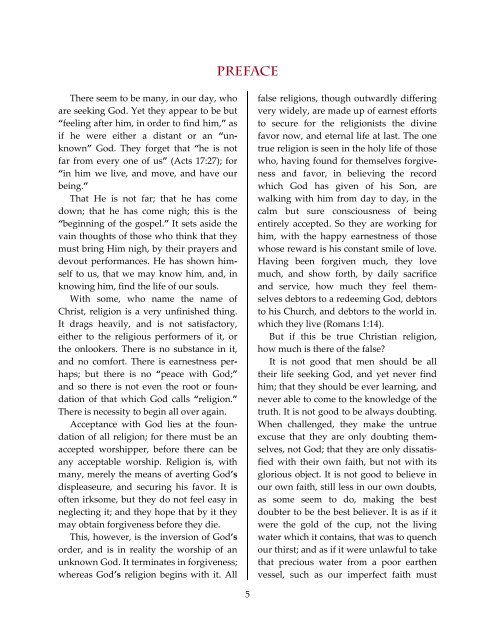God's Way of Peace by Horatius Bonar, D.D.
The seasoned Scottish pastor wrote this short devotional for those suffering from guilt, anxiety, or the consequences of sin. He writes with neither chastisement nor condemnation, but rather immediately directs his readers to Christ’s gift of salvation through his death and resurrection. Bonar reminds all that the Gospel offers hope for the sinner and comfort for the troubled, for God’s perfect, constant grace never fails those who accept it. From Bonar’s time to the present, people have found peace with God afresh through this book. Many people report having read it several times, and turning to it again and again when troubles arise. Kathleen O’Bannon CCEL Staff
The seasoned Scottish pastor wrote this short devotional for those suffering from guilt, anxiety, or the consequences of sin. He writes with neither chastisement nor condemnation, but rather immediately directs his readers to Christ’s gift of salvation through his death and resurrection. Bonar reminds all that the Gospel offers hope for the sinner and comfort for the troubled, for God’s perfect, constant grace never fails those who accept it. From Bonar’s time to the present, people have found peace with God afresh through this book. Many people report having read it several times, and turning to it again and again when troubles arise.
Kathleen O’Bannon
CCEL Staff
Create successful ePaper yourself
Turn your PDF publications into a flip-book with our unique Google optimized e-Paper software.
GOD’S WAY OF PEACE<br />
PREFACE<br />
There seem to be many, in our day, who<br />
are seeking God. Yet they appear to be but<br />
“feeling after him, in order to find him,” as<br />
if he were either a distant or an “unknown”<br />
God. They forget that “he is not<br />
far from every one <strong>of</strong> us” (Acts 17:27); for<br />
“in him we live, and move, and have our<br />
being.”<br />
That He is not far; that he has come<br />
down; that he has come nigh; this is the<br />
“beginning <strong>of</strong> the gospel.” It sets aside the<br />
vain thoughts <strong>of</strong> those who think that they<br />
must bring Him nigh, <strong>by</strong> their prayers and<br />
devout performances. He has shown himself<br />
to us, that we may know him, and, in<br />
knowing him, find the life <strong>of</strong> our souls.<br />
With some, who name the name <strong>of</strong><br />
Christ, religion is a very unfinished thing.<br />
It drags heavily, and is not satisfactory,<br />
either to the religious performers <strong>of</strong> it, or<br />
the onlookers. There is no substance in it,<br />
and no comfort. There is earnestness perhaps;<br />
but there is no “peace with God;”<br />
and so there is not even the root or foundation<br />
<strong>of</strong> that which God calls “religion.”<br />
There is necessity to begin all over again.<br />
Acceptance with God lies at the foundation<br />
<strong>of</strong> all religion; for there must be an<br />
accepted worshipper, before there can be<br />
any acceptable worship. Religion is, with<br />
many, merely the means <strong>of</strong> averting God’s<br />
displeaseure, and securing his favor. It is<br />
<strong>of</strong>ten irksome, but they do not feel easy in<br />
neglecting it; and they hope that <strong>by</strong> it they<br />
may obtain forgiveness before they die.<br />
This, however, is the inversion <strong>of</strong> God’s<br />
order, and is in reality the worship <strong>of</strong> an<br />
unknown God. It terminates in forgiveness;<br />
whereas God’s religion begins with it. All<br />
false religions, though outwardly differing<br />
very widely, are made up <strong>of</strong> earnest efforts<br />
to secure for the religionists the divine<br />
favor now, and eternal life at last. The one<br />
true religion is seen in the holy life <strong>of</strong> those<br />
who, having found for themselves forgiveness<br />
and favor, in believing the record<br />
which God has given <strong>of</strong> his Son, are<br />
walking with him from day to day, in the<br />
calm but sure consciousness <strong>of</strong> being<br />
entirely accepted. So they are working for<br />
him, with the happy earnestness <strong>of</strong> those<br />
whose reward is his constant smile <strong>of</strong> love.<br />
Having been forgiven much, they love<br />
much, and show forth, <strong>by</strong> daily sacrifice<br />
and service, how much they feel themselves<br />
debtors to a redeeming God, debtors<br />
to his Church, and debtors to the world in.<br />
which they live (Romans 1:14).<br />
But if this be true Christian religion,<br />
how much is there <strong>of</strong> the false?<br />
It is not good that men should be all<br />
their life seeking God, and yet never find<br />
him; that they should be ever learning, and<br />
never able to come to the knowledge <strong>of</strong> the<br />
truth. It is not good to be always doubting.<br />
When challenged, they make the untrue<br />
excuse that they are only doubting themselves,<br />
not God; that they are only dissatisfied<br />
with their own faith, but not with its<br />
glorious object. It is not good to believe in<br />
our own faith, still less in our own doubts,<br />
as some seem to do, making the best<br />
doubter to be the best believer. It is as if it<br />
were the gold <strong>of</strong> the cup, not the living<br />
water which it contains, that was to quench<br />
our thirst; and as if it were unlawful to take<br />
that precious water from a poor earthen<br />
vessel, such as our imperfect faith must<br />
5

















